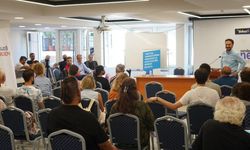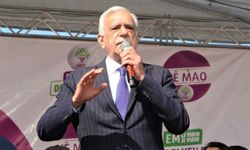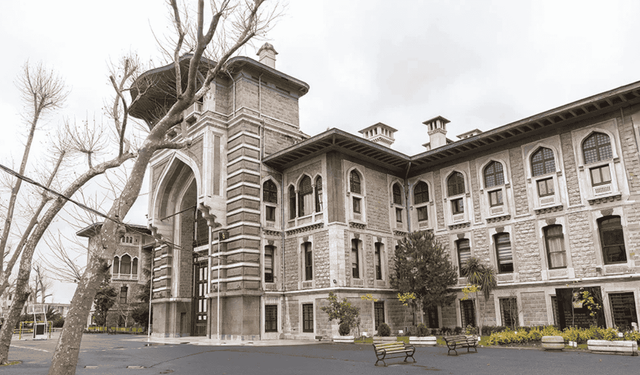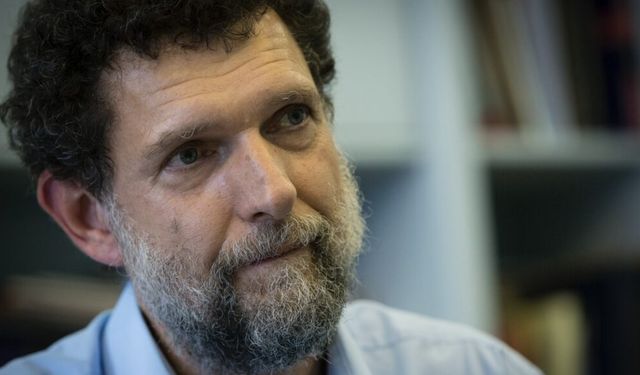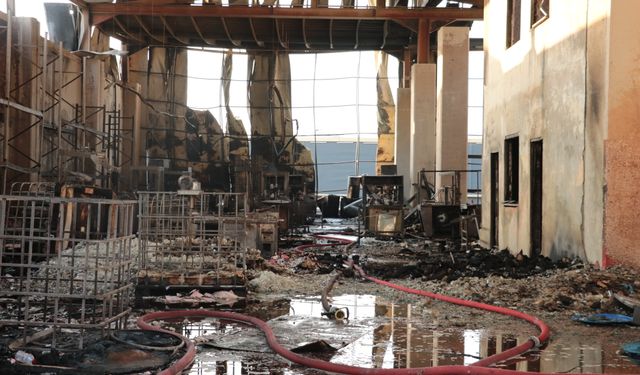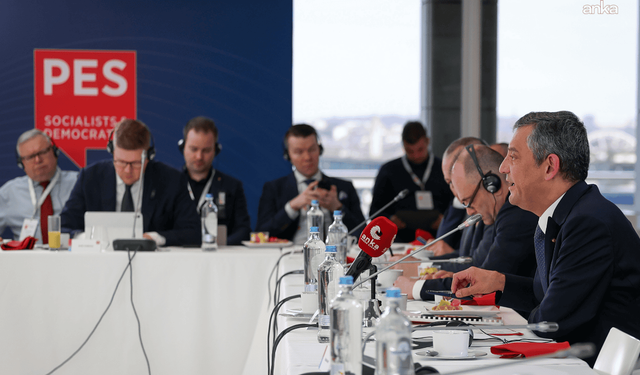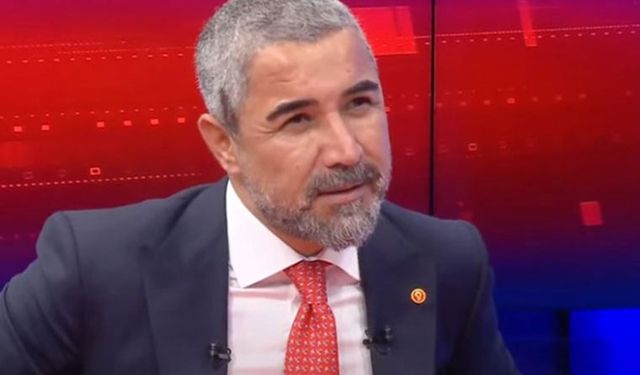Following March 31 municipal elections in Turkey, governing Justice & Development Party AKP had contested the results and forced a repeat of elections for Istanbul's highest seat, for the metropolitan mayor. Opposition alliance's candidate Ekrem Imamoğlu, having won with only 13.500 margin on March 31, has extended his victory to more than 806.000 ballot margin this time, causing distress on the side of the government. International media has generally reflected upon Imamoğlu's victory through AKP chair & President Erdoğan's crushing defeat.
#dokuz8/Gürkan Özturan
On June 23, approximately 9 million Istanbulites have cast their ballots for a second time in three months to elect a mayor for the city's highest seat at Istanbul Metropolitan Municipality. Previously the National Alliance of the Opposition had nominated former Republican People's Party CHP Beylikdüzü Mayor Ekrem Imamoğlu for March 31 elections and won with a slight margin of only 13.500 votes. The victory though not only belonged to CHP but also to its ally IYI Party, as well as silent party in the alliance Peoples' Democratic Party HDP that had abstained from nominating anyone in favour of the opposition in order to defeat AKP. Governing AKP had contested the results, observers and opposition members spent sleepless weeks to receive the mandate on April 17, only to see it canceled on May 6, with a declaration of repeat elections in Istanbul scheduled for June 23. Backed by their far right allies Nationalist Movement Party MHP, the governing AKP has led a campaign making use of all state resources and promising to "serve justice" claiming the vote had been stolen by opposition on March 31. Only two hours after polls closed, right after the election-silence was lifted by Supreme Election Council, Presidential Alliance's candidate Binali Yıldırım had conceded the election congratulating his opponent for his lead in the polls. After several hours when more than 99% of the polls had been counted and registered in the system, Imamoğlu had received more than 806.000 ballots more than his opponent Yıldırım with a 54% of the ballots in Istanbul, authorizing him to be the mayor of Europe's biggest city. There are many reasons why the results have come as they are, but what have international commentators and non-Turkish media said about the Istanbul Elections?PEN NORWAY
[caption id="attachment_19459" align="alignright" width="300"] Norwegian PEN,
Norwegian PEN,Kjersti Løken Stavrum[/caption] Kjersti Løken Stavrum, the president of PEN Norway, CEO of Tinius Trust and secretary general of the Norwegian Press Association has observed the election results coming in at dokuz8NEWS' Election Watch Centre on Sunday, after which she has proceeded to observe the Occupy Gezi Trial on Monday and Tuesday when 16 democracy & human rights advocates were put on trial being accused of attempting to overthrow Turkish government through organizing peaceful protests. Stavrum evaluated the Istanbul Elections results for dokuz8 saying, "the result is a clear message to Erdogan that there is time for political adjustments. However, how he will interpret the message and what he will do about it is another issue. The country is full of surprises and layers of context. I must admit I was hoping for a retake of the last result, but with greater margin. The hope came true, but I would not confuse that with an expectation based on deep analyses, unfortunately. I think it would be a wiser decision if Erdogan were to look closely at the figures and listen carefully to the soft voice of Ekrem İmamoğlu, and figure out how he can use these results for a new and more promising approach to rule of law and freedom of the press. But since we have several years of experience with him, I also fear for some retaliation or recoil in one creative way ot the other."
JOURNALIST INGEBORG SENNESET
[caption id="attachment_19494" align="alignright" width="254"] Aftenposten / Ingeborg Senneset[/caption]
Board member of PEN Norway and journalist Ingeborg Senneset of Aftenposten who has also been in Istanbul before for trial-observation as part of the international mission monitoring journalist trials in Turkey, has also commented on the election results in Istanbul, "The result seems to reflect what I see and hear when observing trials against writers and editors. The Turkish people are aware and awake. They are strong willed and well informed and wish to use their democratic rights, not only on the surface but to make real change. Through these elections, Turks did express a want and need for change and for expressing their will. However election results alone are not proof of democracy. Real democracy depends on freedom of speech and thought, and more importantly, of access to information and press freedom. A piece of the puzzle has been laid down, but there is still far from a full image."
Aftenposten / Ingeborg Senneset[/caption]
Board member of PEN Norway and journalist Ingeborg Senneset of Aftenposten who has also been in Istanbul before for trial-observation as part of the international mission monitoring journalist trials in Turkey, has also commented on the election results in Istanbul, "The result seems to reflect what I see and hear when observing trials against writers and editors. The Turkish people are aware and awake. They are strong willed and well informed and wish to use their democratic rights, not only on the surface but to make real change. Through these elections, Turks did express a want and need for change and for expressing their will. However election results alone are not proof of democracy. Real democracy depends on freedom of speech and thought, and more importantly, of access to information and press freedom. A piece of the puzzle has been laid down, but there is still far from a full image."
INTERNATIONAL PRESS INSTITUTE
[caption id="attachment_19461" align="alignleft" width="300"] IPI / Scott Griffen[/caption]
As an international press freedom organization, International Press Institute has for years been monitoring Turkey closely and having meetings with Turkish officials, demanding release of imprisoned journalists, lifting of pressure from independent media and for rule of law to be respected in general. Recently after dokuz8NEWS' flagship account had been suspended on Twitter only 2 days before the Istanbul Elections, IPI had also joined an international campaign to get it reinstated immediately. Deputy Director of IPI, Scott Griffen has evaluated the Istanbul Elections for dokuz8NEWS and said "On the one hand, the election results in Istanbul were expected given the polling numbers and the initial results in March. On the other hand, they are quite surprising if you consider that one party controls 90 percent of the media and that it is very difficult for the public to receive balanced and critical information about the candidates. In this sense, the results indicate both the strength of voters’ desire for change in Istanbul despite nearly full control of the mainstream media and that new journalistic platforms and digital media have proved that they were able to play an effective role in helping form public opinion. What we hope is that this result will be a sign of encouragement for Turkey’s journalists and may offer them some relief from an environment of fear and intimidation that has been the status quo for the past few years under a vast state media crackdown. It is also encouragement for the existing independent media in Turkey to continue their critical work to provide the public with pluralistic news and information."
IPI / Scott Griffen[/caption]
As an international press freedom organization, International Press Institute has for years been monitoring Turkey closely and having meetings with Turkish officials, demanding release of imprisoned journalists, lifting of pressure from independent media and for rule of law to be respected in general. Recently after dokuz8NEWS' flagship account had been suspended on Twitter only 2 days before the Istanbul Elections, IPI had also joined an international campaign to get it reinstated immediately. Deputy Director of IPI, Scott Griffen has evaluated the Istanbul Elections for dokuz8NEWS and said "On the one hand, the election results in Istanbul were expected given the polling numbers and the initial results in March. On the other hand, they are quite surprising if you consider that one party controls 90 percent of the media and that it is very difficult for the public to receive balanced and critical information about the candidates. In this sense, the results indicate both the strength of voters’ desire for change in Istanbul despite nearly full control of the mainstream media and that new journalistic platforms and digital media have proved that they were able to play an effective role in helping form public opinion. What we hope is that this result will be a sign of encouragement for Turkey’s journalists and may offer them some relief from an environment of fear and intimidation that has been the status quo for the past few years under a vast state media crackdown. It is also encouragement for the existing independent media in Turkey to continue their critical work to provide the public with pluralistic news and information."
EUROPEAN CENTRE FOR PRESS AND MEDIA FREEDOM
Another significant press freedom organization that also keeps Turkey on its focus is European Centre for Press and Media Freedom ECPMF, which also had joined the international call to get dokuz8NEWS reinstated on Twitter a couple of days before the Istanbul Elections. An institutional commentary has been published by ECPMF for dokuz8NEWS regarding the election results, "despite the crackdown on media freedom and the rule of law, the results of renewed elections in Istanbul send a positive sign for democracy in Turkey. However it should not be forgotten that there are still over 140 journalists in jail, many others are standing trial, with accusations of 'insulting the president' or 'terror propaganda'. We hope that Turkish President Erdogan now will not be even more restrictive to manifest his power. We hope for positive change."JOURNALIST ADAM KLASFELD
[caption id="attachment_19462" align="alignright" width="300"] Courthouse News / Adam Klasfeld[/caption]
In the last two years, Courthouse News reporter Adam Klasfeld has become a popular journalist in Turkey thanks to his coverage of Reza Zarrab trial in New York, US. In his commentary for dokuz8NEWS Klasfeld said, "If journalists are advocates for anything, we are advocates for and defenders of democracy because without democracy our work is hobbled. We help voters make informed decisions, hold officials into account, and uphold the right to dissent and disseminate facts others would like to censor. On June 23, Istanbul’s voters provided inspiring evidence that Turkish democracy is very much alive, and its citizens would not accept the government decreeing that their will and their choice was mistaken. The trial of Osman Kavala and the other 15 rights advocates of Gezi taking place on June 24-25, highlights how the fight to restore democracy has not ended.”
Courthouse News / Adam Klasfeld[/caption]
In the last two years, Courthouse News reporter Adam Klasfeld has become a popular journalist in Turkey thanks to his coverage of Reza Zarrab trial in New York, US. In his commentary for dokuz8NEWS Klasfeld said, "If journalists are advocates for anything, we are advocates for and defenders of democracy because without democracy our work is hobbled. We help voters make informed decisions, hold officials into account, and uphold the right to dissent and disseminate facts others would like to censor. On June 23, Istanbul’s voters provided inspiring evidence that Turkish democracy is very much alive, and its citizens would not accept the government decreeing that their will and their choice was mistaken. The trial of Osman Kavala and the other 15 rights advocates of Gezi taking place on June 24-25, highlights how the fight to restore democracy has not ended.”
KlasseKampen
[caption id="attachment_19552" align="alignleft" width="160"] KlasseKampen / Mari Eifring[/caption]
Norwegian daily newspaper KlasseKampen (Class Struggle) International News Editor, Mari Eifring commented on Istanbul elections for dokuz8NEWS, "I was curious about how this re-election would turn out. Both from the last result in March and from the polls, it looked like CHP would win, but there was the question, how such a result would be handled this time. I was not that surprised that Ekrem İmamoğlu won again, but it was in surprising in a way that the lead had strenghtened significantly since the last election. I suspect this had to do with many Istanbulites, also some of those who voted for AKP in the last round, reacting negatively to the fact that the last election was annulled on dubious grounds. It will be very interesting now to see what this result will lead to. My impression is that many oppositional voices are relieved and revitalized after seeing that it is actually possible to win elections, and that democracy still has a place in Turkey. However, it remains to see also how the government will respond to the loss of Istanbul as a stronghold. Even though president Erdoğan was quick to congratulate İmamoğlu, I think it remains an open question whether the government will be more open to opppositional voices or if it will choose the opposite strategy and crack down even harder on opposition in its different forms. So, to sum up, the election results gave hope for a more democratic development in Turkey, but it will be even more exciting than ever to follow Turkey and see if this development finds strenght."
KlasseKampen / Mari Eifring[/caption]
Norwegian daily newspaper KlasseKampen (Class Struggle) International News Editor, Mari Eifring commented on Istanbul elections for dokuz8NEWS, "I was curious about how this re-election would turn out. Both from the last result in March and from the polls, it looked like CHP would win, but there was the question, how such a result would be handled this time. I was not that surprised that Ekrem İmamoğlu won again, but it was in surprising in a way that the lead had strenghtened significantly since the last election. I suspect this had to do with many Istanbulites, also some of those who voted for AKP in the last round, reacting negatively to the fact that the last election was annulled on dubious grounds. It will be very interesting now to see what this result will lead to. My impression is that many oppositional voices are relieved and revitalized after seeing that it is actually possible to win elections, and that democracy still has a place in Turkey. However, it remains to see also how the government will respond to the loss of Istanbul as a stronghold. Even though president Erdoğan was quick to congratulate İmamoğlu, I think it remains an open question whether the government will be more open to opppositional voices or if it will choose the opposite strategy and crack down even harder on opposition in its different forms. So, to sum up, the election results gave hope for a more democratic development in Turkey, but it will be even more exciting than ever to follow Turkey and see if this development finds strenght."
SWEDISH RESEARCH DEFENCE AGENCY
[caption id="attachment_19467" align="alignleft" width="200"] FOI / Bitte Hammargren[/caption]
Formerly a journalist and now an analyst for the Swedish Defence Research Agency FOI, Bitte Hammargren has also evaluated the Istanbul Elections for dokuz8NEWS, "These results show that the political landscape in Turkey is so much more colorful than the parliamentary and presidential elections in 2018 showed. And the opposition has found a new strategy to unify and to beat the AKP, with Kurds coming out as kingmakers. İmamoğlu's non-confrontational posture has brought in much needed fresh air to Turkish politics. President Erdogan may plan a revenge, but the time is approaching when he will be seen as 'yesterday's man' in Turkey, The strengthening of the Turkish lira just after the elections is also a clear sign of how the financial markets are interpreting the elections. Many, including me, are curious to see if the former economy minister, Ali Babacan and others from AKP will step forwards to form a new party. This would make the political landscape even more colorful. Concerning the rule of law locally, I am less optimistic in the short term. But let's keep some hope for the longer term. The gap between İmamoğlu and Yıldırım was bigger than expected and it was a surprise to see that İmamoğlu came out first even in conservative districts like Eyüp and Fatih. But it was expected that many of those who hesitated to vote for İmamoğlu in 31 March, would come out in his favor in the re-run, since they felt that an injustice had been made against him."
FOI / Bitte Hammargren[/caption]
Formerly a journalist and now an analyst for the Swedish Defence Research Agency FOI, Bitte Hammargren has also evaluated the Istanbul Elections for dokuz8NEWS, "These results show that the political landscape in Turkey is so much more colorful than the parliamentary and presidential elections in 2018 showed. And the opposition has found a new strategy to unify and to beat the AKP, with Kurds coming out as kingmakers. İmamoğlu's non-confrontational posture has brought in much needed fresh air to Turkish politics. President Erdogan may plan a revenge, but the time is approaching when he will be seen as 'yesterday's man' in Turkey, The strengthening of the Turkish lira just after the elections is also a clear sign of how the financial markets are interpreting the elections. Many, including me, are curious to see if the former economy minister, Ali Babacan and others from AKP will step forwards to form a new party. This would make the political landscape even more colorful. Concerning the rule of law locally, I am less optimistic in the short term. But let's keep some hope for the longer term. The gap between İmamoğlu and Yıldırım was bigger than expected and it was a surprise to see that İmamoğlu came out first even in conservative districts like Eyüp and Fatih. But it was expected that many of those who hesitated to vote for İmamoğlu in 31 March, would come out in his favor in the re-run, since they felt that an injustice had been made against him."
DR. LISEL HINTZ
[caption id="attachment_19463" align="alignright" width="267"] Johns Hopkins SAIS / Dr. Lisel Hintz[/caption]
Johns Hopkins University, Advanced International Studies, International Relations professor Dr. Lisel Hintz who has also published a book on Turkey's identity politics in the past year, titled 'Identity Politics Inside Out: National Identity Contestation and Foreign Policy in Turkey' has commented on Istanbul Elections for dokuz8NEWS as well. Dr. Hintz said, "The significance of Ekrem İmamoğlu's -second- win in Istanbul cannot be understated for several reasons. Turkey's opposition actors certainly deserve an immense amount of credit for uniting under very difficult circumstances. İmamoğlu in particular represented a much-needed change in political discourse, emphasizing the power of unity over divisiveness and polarization. Erdogan's go-to tactic of identity politics fell flat against this optimistic, relatively soft-spoken CHP candidate. Unlike the aggressively feisty Muharrem Ince, İmamoğlu refused to take Erdogan's bait; he also refused to allow media attention to fade away on the night of March 31 election, which I see as crucial in preventing the AKP from simply declaring a win that night. İmamoğlu's message of strength through unity also facilitated the support of Kurdish and HDP voters who traditionally have felt ostracized by the CHP. Despite all of Erdogan's last-minute outreach, extending even so far as to leak a letter from Abdullah Ocalan calling for Kurds to remain neutral, initial numbers seem to indicate Kurds maintained and possibly even increased their support for the CHP candidate. This cannot be underestimated. However, before we understand the significance for Turkey's system of governance more broadly, i.e. whether this means democracy has returned to Turkey, we need to see how Erdogan reacts to İmamoğlu's victory. Over the past decade as prime minister and president Erdogan has been constructing what has culminated in a highly consolidated personalistic authoritarian regime, and Istanbul serves not only as a symbol of where he launched his political career but also as a massive source of rents that can be used to garner electoral support. We've seen already through the re-run that he was not willing to let it go easily. We now have to wait and see whether İmamoğlu's tenure as mayor will be interfered with in any way, whether by cutting off funding and hampering his office's ability to provide services or by removing him under some legal pretext (allegedly having insulted the mayor of Ordu, for example) and replacing him with a trustee. In terms of Turkey’s international image, I do think this will bolster discussions about a “return to democracy,” a “rebuke of authoritarianism,” and a “crumbling of Erdogan’s personalistic grip.” As much as I appreciate these sentiments and believe the opposition should enjoy their hard-fought and well-earned victory, I worry that such sweeping pronouncements are too early and too optimistic. To understand how this shapes the future of democratic practices in Turkey, and in turn how the international community responds to and interacts with Turkey’s democracy advocates, we need to see how the AKP regime will respond as I mentioned above. The mere existence of the Gezi Trials - that democracy and human rights advocates have been detained on the most absurd charges - means that democratic norms and practices have a long way to go before they are internalized. One election - and a big one at that - can be a catalyst that galvanizes momentum for change, but it’s going to take much more progress, and most probably the end of Erdogan’s rule, before internal and external observers can rightfully claim democracy has returned to Turkey."
Johns Hopkins SAIS / Dr. Lisel Hintz[/caption]
Johns Hopkins University, Advanced International Studies, International Relations professor Dr. Lisel Hintz who has also published a book on Turkey's identity politics in the past year, titled 'Identity Politics Inside Out: National Identity Contestation and Foreign Policy in Turkey' has commented on Istanbul Elections for dokuz8NEWS as well. Dr. Hintz said, "The significance of Ekrem İmamoğlu's -second- win in Istanbul cannot be understated for several reasons. Turkey's opposition actors certainly deserve an immense amount of credit for uniting under very difficult circumstances. İmamoğlu in particular represented a much-needed change in political discourse, emphasizing the power of unity over divisiveness and polarization. Erdogan's go-to tactic of identity politics fell flat against this optimistic, relatively soft-spoken CHP candidate. Unlike the aggressively feisty Muharrem Ince, İmamoğlu refused to take Erdogan's bait; he also refused to allow media attention to fade away on the night of March 31 election, which I see as crucial in preventing the AKP from simply declaring a win that night. İmamoğlu's message of strength through unity also facilitated the support of Kurdish and HDP voters who traditionally have felt ostracized by the CHP. Despite all of Erdogan's last-minute outreach, extending even so far as to leak a letter from Abdullah Ocalan calling for Kurds to remain neutral, initial numbers seem to indicate Kurds maintained and possibly even increased their support for the CHP candidate. This cannot be underestimated. However, before we understand the significance for Turkey's system of governance more broadly, i.e. whether this means democracy has returned to Turkey, we need to see how Erdogan reacts to İmamoğlu's victory. Over the past decade as prime minister and president Erdogan has been constructing what has culminated in a highly consolidated personalistic authoritarian regime, and Istanbul serves not only as a symbol of where he launched his political career but also as a massive source of rents that can be used to garner electoral support. We've seen already through the re-run that he was not willing to let it go easily. We now have to wait and see whether İmamoğlu's tenure as mayor will be interfered with in any way, whether by cutting off funding and hampering his office's ability to provide services or by removing him under some legal pretext (allegedly having insulted the mayor of Ordu, for example) and replacing him with a trustee. In terms of Turkey’s international image, I do think this will bolster discussions about a “return to democracy,” a “rebuke of authoritarianism,” and a “crumbling of Erdogan’s personalistic grip.” As much as I appreciate these sentiments and believe the opposition should enjoy their hard-fought and well-earned victory, I worry that such sweeping pronouncements are too early and too optimistic. To understand how this shapes the future of democratic practices in Turkey, and in turn how the international community responds to and interacts with Turkey’s democracy advocates, we need to see how the AKP regime will respond as I mentioned above. The mere existence of the Gezi Trials - that democracy and human rights advocates have been detained on the most absurd charges - means that democratic norms and practices have a long way to go before they are internalized. One election - and a big one at that - can be a catalyst that galvanizes momentum for change, but it’s going to take much more progress, and most probably the end of Erdogan’s rule, before internal and external observers can rightfully claim democracy has returned to Turkey."
INSTITUTE FOR NATIONAL SECURITY STUDIES
[caption id="attachment_19464" align="alignleft" width="300"] INSS / Dr. Gallia Lindenstrauss[/caption]
Senior Research Fellow, Institute for National Security Studies in Israel, focusing also on Turkey, Dr. Gallia Lindenstrauss has commented on the results of Istanbul Elections for dokuz8NEWS also, "It has been a stunning victory - much more than the March elections, since from a gap of less than one percent between Imamoglu and Yildirim, it was now more than 9 percent. The rerun of elections was a colossal mistake on part of the AKP. When comparing the current rerun to what happened in the Turkish general elections in 2015, I did think Erdogan had a plan of how to reverse the results of the March 2019 elections. Even if he had such a plan, clearly it didn't work. What was also surprising was the landslide victory this time. In the short run clearly it has improved the image of Turkey. In the long run it depends on the effects of the local elections on the national politics -whether Imamoglu positive campaign will also have a mitigating effect on Turkish foreign policy, which seems to many actors in the international system as revisionist."
INSS / Dr. Gallia Lindenstrauss[/caption]
Senior Research Fellow, Institute for National Security Studies in Israel, focusing also on Turkey, Dr. Gallia Lindenstrauss has commented on the results of Istanbul Elections for dokuz8NEWS also, "It has been a stunning victory - much more than the March elections, since from a gap of less than one percent between Imamoglu and Yildirim, it was now more than 9 percent. The rerun of elections was a colossal mistake on part of the AKP. When comparing the current rerun to what happened in the Turkish general elections in 2015, I did think Erdogan had a plan of how to reverse the results of the March 2019 elections. Even if he had such a plan, clearly it didn't work. What was also surprising was the landslide victory this time. In the short run clearly it has improved the image of Turkey. In the long run it depends on the effects of the local elections on the national politics -whether Imamoglu positive campaign will also have a mitigating effect on Turkish foreign policy, which seems to many actors in the international system as revisionist."
CENTER FOR AMERICAN PROGRESS
[caption id="attachment_19517" align="alignright" width="385"]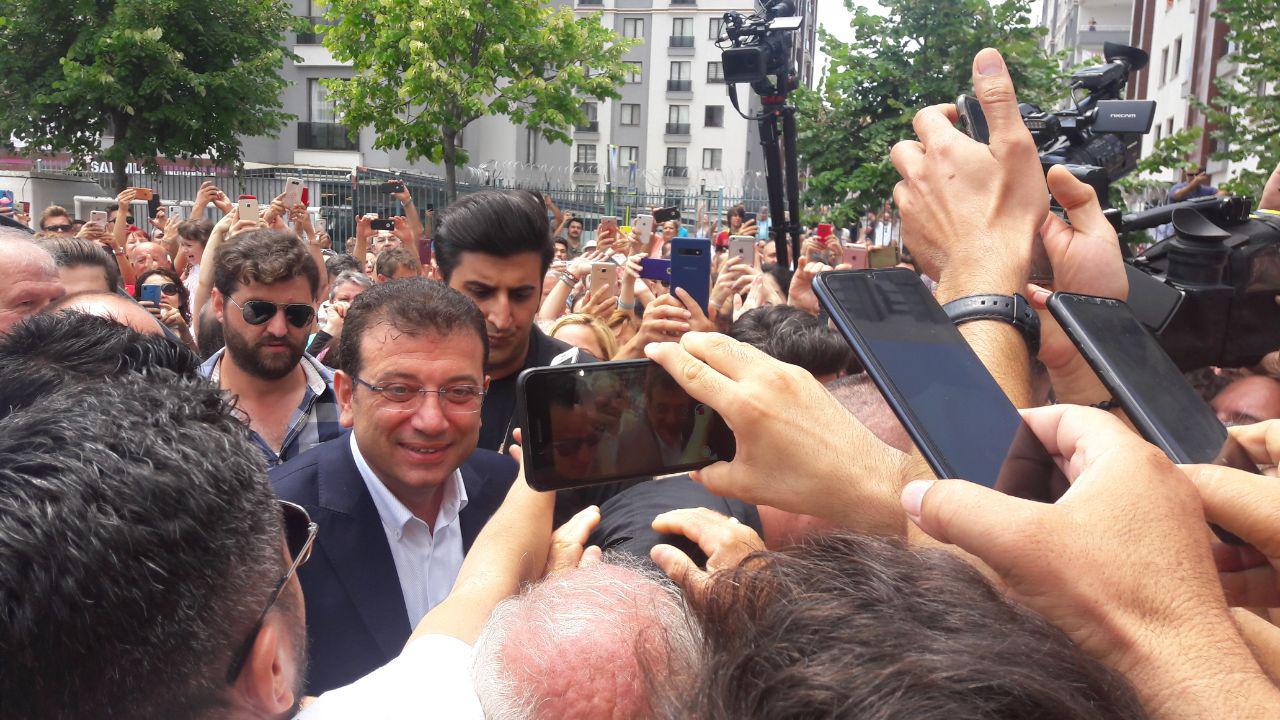 Imamoğlu, June 23[/caption]
A Senior fellow for National Security and International Policy at Center for American Progress and formerly covering Turkey as senior staff member at the Committee on Foreign Affairs in the U.S. House of Representatives, Alan Makovsky evaluated the Istanbul elections for dokuz8NEWS, “The most important result of the election was the triumph of democracy. Around 800,000 people who did not vote for Imamoglu on March 31 did vote for him this time simply, it appears, for the sake of righting an injustice. Those voters thunderously confirmed the well-established legitimacy of İmamoğlu’s March 31 triumph. Post-March 31 polls have consistently shown that most Istanbulites, including a significant minority of Yıldırım voters, viewed Imamoglu as the legitimate victor on March 31 and saw no need for a second election. How many of those 800,000 will become actual supporters of İmamoğlu remains to be seen. For now, the landslide vote must be seen primarily as a rebuke to the high-handed tactics that attempted to take from İmamoğlu what he legitimately won and as a rebuke to President Erdoğan personally, since he is widely perceived to be the force that compelled the YSK to revoke İmamoğlu’s mandate and require a second vote. The second result is that Erdoğan’s waning reputation as a political genius has been seriously further tarnished, perhaps destroyed, creating the perception that he is politically weakened. It is not yet clear what the impact of that perception will be in practical terms. Perhaps journalists will feel bolder in criticizing the government and courts will act somewhat more independently, as was the case during a brief interlude when AKP lost its parliamentary majority in June 2015. Perhaps AKP supporters and deputies will be more inclined to join the breakaway movement reportedly in the works involving Gül, Babacan, and/or Davutoğlu. Following June 2015, Erdoğan re-fortified his and AKP’s position with a second election five months later. With no election in sight this time, Erdoğan now might use his vast powers as President and his sway over the judiciary to try to intimidate potential opposition and thereby re-affirm the unassailability of his leadership. For now, it is clear that Erdoğan responded to a significant defeat on March 31, by turning it into a disaster. The June 23 election overshadows all the March 31 results in the rest of the nation, virtually obliterating what claims to success AKP could legitimately make on that disappointing day (disappointing for AKP, that is). Although CHP took 5 of Turkey’s 6 largest cities (including Istanbul), AKP won more provincial capitals, more metropolises, and far more provincial councillor positions (as well as the popular vote for those positions). Also, notwithstanding Yildirim’s narrow loss, AKP seemingly remained the most popular party in Istanbul (evident because HDP supporters formed such a significant element of İmamoğlu’s March 31 vote total). Those achievements may have paled in newsworthiness to the opposition’s success in big-city mayoralties, but they were hardly insignificant. Yet, in popular perception, they are now diminished almost to nothing in light of Imamoglu’s June 23 blowout. For the first time in AKP’s existence, it is even questionable whether AKP is the most popular party in Istanbul. According to Metropoll’s mid-June pre-election survey, AKP would best CHP only 38% to 36%, within the margin of error, in a putative parliamentary vote among Istanbulites (a pure measure of party popularity). In the last actual parliamentary vote in Istanbul, only one year ago, AKP out-polled CHP 42% to 26%. The third result is that CHP has found a formula to overcome some of the historical baggage that has burdened its previous campaign efforts: accepting religion and religious people as a legitimate part of Turkey’s political and cultural landscape, and running candidates with whom center-right voters are comfortable. Both İmamoğluand Mansur Yavaş, although differing from one another in background, fit the latter profile. For decades, the secular center-right dominated Turkish elections, until it was swallowed by AKP. Ironically, it is beginning to re-emerge somewhat through the vehicle of its old nemesis, the CHP. A final result was already clear after March 31, and that is the swing-vote role played by HDP. Reckoning with HDP’s electoral clout will impose challenging policy and political decisions on every party as it plans its future strategies.”
Imamoğlu, June 23[/caption]
A Senior fellow for National Security and International Policy at Center for American Progress and formerly covering Turkey as senior staff member at the Committee on Foreign Affairs in the U.S. House of Representatives, Alan Makovsky evaluated the Istanbul elections for dokuz8NEWS, “The most important result of the election was the triumph of democracy. Around 800,000 people who did not vote for Imamoglu on March 31 did vote for him this time simply, it appears, for the sake of righting an injustice. Those voters thunderously confirmed the well-established legitimacy of İmamoğlu’s March 31 triumph. Post-March 31 polls have consistently shown that most Istanbulites, including a significant minority of Yıldırım voters, viewed Imamoglu as the legitimate victor on March 31 and saw no need for a second election. How many of those 800,000 will become actual supporters of İmamoğlu remains to be seen. For now, the landslide vote must be seen primarily as a rebuke to the high-handed tactics that attempted to take from İmamoğlu what he legitimately won and as a rebuke to President Erdoğan personally, since he is widely perceived to be the force that compelled the YSK to revoke İmamoğlu’s mandate and require a second vote. The second result is that Erdoğan’s waning reputation as a political genius has been seriously further tarnished, perhaps destroyed, creating the perception that he is politically weakened. It is not yet clear what the impact of that perception will be in practical terms. Perhaps journalists will feel bolder in criticizing the government and courts will act somewhat more independently, as was the case during a brief interlude when AKP lost its parliamentary majority in June 2015. Perhaps AKP supporters and deputies will be more inclined to join the breakaway movement reportedly in the works involving Gül, Babacan, and/or Davutoğlu. Following June 2015, Erdoğan re-fortified his and AKP’s position with a second election five months later. With no election in sight this time, Erdoğan now might use his vast powers as President and his sway over the judiciary to try to intimidate potential opposition and thereby re-affirm the unassailability of his leadership. For now, it is clear that Erdoğan responded to a significant defeat on March 31, by turning it into a disaster. The June 23 election overshadows all the March 31 results in the rest of the nation, virtually obliterating what claims to success AKP could legitimately make on that disappointing day (disappointing for AKP, that is). Although CHP took 5 of Turkey’s 6 largest cities (including Istanbul), AKP won more provincial capitals, more metropolises, and far more provincial councillor positions (as well as the popular vote for those positions). Also, notwithstanding Yildirim’s narrow loss, AKP seemingly remained the most popular party in Istanbul (evident because HDP supporters formed such a significant element of İmamoğlu’s March 31 vote total). Those achievements may have paled in newsworthiness to the opposition’s success in big-city mayoralties, but they were hardly insignificant. Yet, in popular perception, they are now diminished almost to nothing in light of Imamoglu’s June 23 blowout. For the first time in AKP’s existence, it is even questionable whether AKP is the most popular party in Istanbul. According to Metropoll’s mid-June pre-election survey, AKP would best CHP only 38% to 36%, within the margin of error, in a putative parliamentary vote among Istanbulites (a pure measure of party popularity). In the last actual parliamentary vote in Istanbul, only one year ago, AKP out-polled CHP 42% to 26%. The third result is that CHP has found a formula to overcome some of the historical baggage that has burdened its previous campaign efforts: accepting religion and religious people as a legitimate part of Turkey’s political and cultural landscape, and running candidates with whom center-right voters are comfortable. Both İmamoğluand Mansur Yavaş, although differing from one another in background, fit the latter profile. For decades, the secular center-right dominated Turkish elections, until it was swallowed by AKP. Ironically, it is beginning to re-emerge somewhat through the vehicle of its old nemesis, the CHP. A final result was already clear after March 31, and that is the swing-vote role played by HDP. Reckoning with HDP’s electoral clout will impose challenging policy and political decisions on every party as it plans its future strategies.”
 Mr. Makovsky continued to evaluate the repercussions of the Istanbul elections in international community in terms of government and country image, “The message sent to the international community is that the democratic spirit remains vibrant among much of the Turkish electorate, to the extent that a segment of the pro-AKP and pro-People’s Alliance populace was willing to change its vote for the sake of ensuring that justice is done. The government’s anti-democratic image, however, has only worsened. It is seen to have acceded to Imamoglu’s election only because of an overwhelming vote — and a smotheringly effective ballot-box monitoring operation staged by CHP — that rendered result-reversal impossible, not because of a sudden commitment to democratic values. Indeed, Erdogan’s resort to a second election was an “own goal.” The international community now will be watching closely — more closely than it would have had Imamoglu been allowed to assume his seat immediately after March 31 — to see how the central government treat."
Mr. Makovsky continued to evaluate the repercussions of the Istanbul elections in international community in terms of government and country image, “The message sent to the international community is that the democratic spirit remains vibrant among much of the Turkish electorate, to the extent that a segment of the pro-AKP and pro-People’s Alliance populace was willing to change its vote for the sake of ensuring that justice is done. The government’s anti-democratic image, however, has only worsened. It is seen to have acceded to Imamoglu’s election only because of an overwhelming vote — and a smotheringly effective ballot-box monitoring operation staged by CHP — that rendered result-reversal impossible, not because of a sudden commitment to democratic values. Indeed, Erdogan’s resort to a second election was an “own goal.” The international community now will be watching closely — more closely than it would have had Imamoglu been allowed to assume his seat immediately after March 31 — to see how the central government treat."
SCANDINAVIAN MEDIA SEES "VICTORY FOR DEMOCRACY"
Swedish state broadcaster SVT has announced the results of Istanbul Elections as "Victory for opposition" while the Norwegian counterparts NRK have used the title "voters have saved the last pieces of democracy". Norwegian daily KlasseKampen also announced the election results, with the title "Erdoğan lost Istanbul" while in the news article they drew attention to governing AKP losing major metropolises of Turkey following March 31 municipal elections. Popular Norwegian paper Aftenposten also used the title "Crushing defeat for Erdoğan in Istanbul" in its election coverage. Danish publication Berlingske also published an extensive article on the results of Istanbul elections where they have drawn attention to growing pressure targeting the opposition, civil society and media in recent years while Istanbulites have reclaimed democracy. Berlingske chose the title "Erdoğan thought he could change the results in Istanbul, but fortunately made a grand mistake" for the article that highlights the hope that emerged out of the ballot box for those wanting to see substantial democratic change in Turkey.GREEK MEDIA DOES NOT MENTION ANYTHING ON PONTUS DISCUSSION
Prior to Istanbul Elections governing AKP's officials had made comments suggesting that opposition candidate Ekrem İmamoğlu is coming from Pontian descent -ethnic Greek community living in Blacksea region of Turkey- and would convert Hagia Sophia Museum back into an Orthodox Greek Cathedral. İmamoğlu had reacted against claims saying he does not wish to see any remarks that would create divisions within the society and asked 'what difference would it make if someone was Greek or Armenian?'. Following İmamoğlu's win in Istanbul, Greek newspapers would be some of the first to be seen by those wishing to find proof of AKP's claims, however it was nowhere to be found. [caption id="attachment_19465" align="alignright" width="300"] Imamoğlu[/caption]
One of the most popular Greek newspapers, Kathimerini came out with the headline "İmamoğlu's victory, Erdoğan in a difficult position". Another Greek paper Ta Nea said "Istanbul: İmamoğlu's triumph, the beginning of the end for Erdoğan" while Ethnos published a photo of İmamoğlu's victory speech and used the headline "Municipal crash for Erdoğan, beaten twice in Istanbul." Efimeritha ton Syntakton also reflected on the Istanbul Elections through "Triumph for Ekrem İmamoğlu in Istanbul and humiliating defeat for Erdoğan" while finally Eleftheros Typos published a victorious İmamoğlu photograph with the headline "A slap in the face of Erdoğan."
Imamoğlu[/caption]
One of the most popular Greek newspapers, Kathimerini came out with the headline "İmamoğlu's victory, Erdoğan in a difficult position". Another Greek paper Ta Nea said "Istanbul: İmamoğlu's triumph, the beginning of the end for Erdoğan" while Ethnos published a photo of İmamoğlu's victory speech and used the headline "Municipal crash for Erdoğan, beaten twice in Istanbul." Efimeritha ton Syntakton also reflected on the Istanbul Elections through "Triumph for Ekrem İmamoğlu in Istanbul and humiliating defeat for Erdoğan" while finally Eleftheros Typos published a victorious İmamoğlu photograph with the headline "A slap in the face of Erdoğan."

